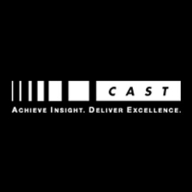

GitLab and CAST Highlight are both strong competitors in the DevOps and code analysis categories, respectively. GitLab holds an advantage due to its comprehensive development features, offering a broad range, including CI/CD and code review capabilities.
Features: GitLab provides a robust CI/CD pipeline, extensive code repository management, and seamless code review processes. It supports a variety of development and automation operations. In contrast, CAST Highlight focuses on code readiness for the cloud, requiring no direct codebase access, integrating well with Azure DevOps, and emphasizing quick solutions for automation and speed.
Room for Improvement: GitLab could improve integration with third-party tools like Jira, enhance AWS and container management, and offer better reporting features. CAST Highlight is noted for its high cost, difficulty in configuration, and less comprehensive dashboards compared to CAST AIP. Both platforms could benefit from broader integration capabilities and more user-friendly interfaces.
Ease of Deployment and Customer Service: GitLab shines with flexible deployment options across various clouds and on-premises environments. Although its open-source nature supports community help, official support needs quicker response times. CAST Highlight mainly operates on-premises with some cloud options, but lacks dedicated support unless purchased separately. Both solutions could improve their official support offerings.
Pricing and ROI: GitLab offers a range from a free edition to costly premium options, providing substantial feature richness which contributes to a positive ROI. CAST Highlight is seen as expensive, and its cost could be a limitation for some users. Despite this, both solutions are acknowledged for enhancing productivity and delivering good ROI, with GitLab typically presenting more value for integration of development lifecycles.
| Product | Market Share (%) |
|---|---|
| GitLab | 3.8% |
| CAST Highlight | 1.1% |
| Other | 95.1% |


| Company Size | Count |
|---|---|
| Small Business | 2 |
| Midsize Enterprise | 1 |
| Large Enterprise | 4 |
| Company Size | Count |
|---|---|
| Small Business | 36 |
| Midsize Enterprise | 10 |
| Large Enterprise | 46 |
CAST Highlight is a SaaS software intelligence product for performing rapid application portfolio analysis. It automatically analyzes source code of hundreds of applications in a week for Cloud Readiness, Software Composition Analysis (Open Source risks), Resiliency, and Technical Debt. Objective software insights from automated source code analysis combined with built-in qualitative surveys for business context enable more informed decision-making about application portfolios.
CAST is the software intelligence category leader. CAST technology can see inside custom applications with MRI-like precision, automatically generating intelligence about their inner workings - composition, architecture, transaction flows, cloud readiness, structural flaws, legal and security risks. It’s becoming essential for faster modernization for cloud, raising the speed and efficiency of Software Engineering, better open source risk control, and accurate technical due diligence. CAST operates globally with offices in North America, Europe, India, China. Visit www.castsoftware.com.
GitLab offers a secure and user-friendly platform for CI/CD pipeline management, code repository control, and collaboration, enhancing development speed and efficiency. It facilitates automation with extensive customization and tool integration, ideal for DevOps processes.
GitLab supports source code management, version control, and collaborative development. It's frequently used in CI/CD processes to automate builds and deployments while integrating DevOps practices. GitLab allows companies to manage repositories, automate pipelines, conduct code reviews, and maintain development lifecycles. The platform supports infrastructure and configuration management, enabling efficient code collaboration, deployment automation, and comprehensive repository handling. Many organizations commit and deploy developed code using GitLab's capabilities.
What are GitLab's most valuable features?In specific industries, GitLab serves as a backbone for source code management and CI/CD implementation. Companies leverage its capabilities for infrastructure management and deployment automation, thus streamlining project delivery timelines. Its ability to handle configuration management and code repositories effectively aids in maintaining development lifecycles, making it a preferred choice for organizations committed to enhancing their DevOps practices.
We monitor all Software Composition Analysis (SCA) reviews to prevent fraudulent reviews and keep review quality high. We do not post reviews by company employees or direct competitors. We validate each review for authenticity via cross-reference with LinkedIn, and personal follow-up with the reviewer when necessary.